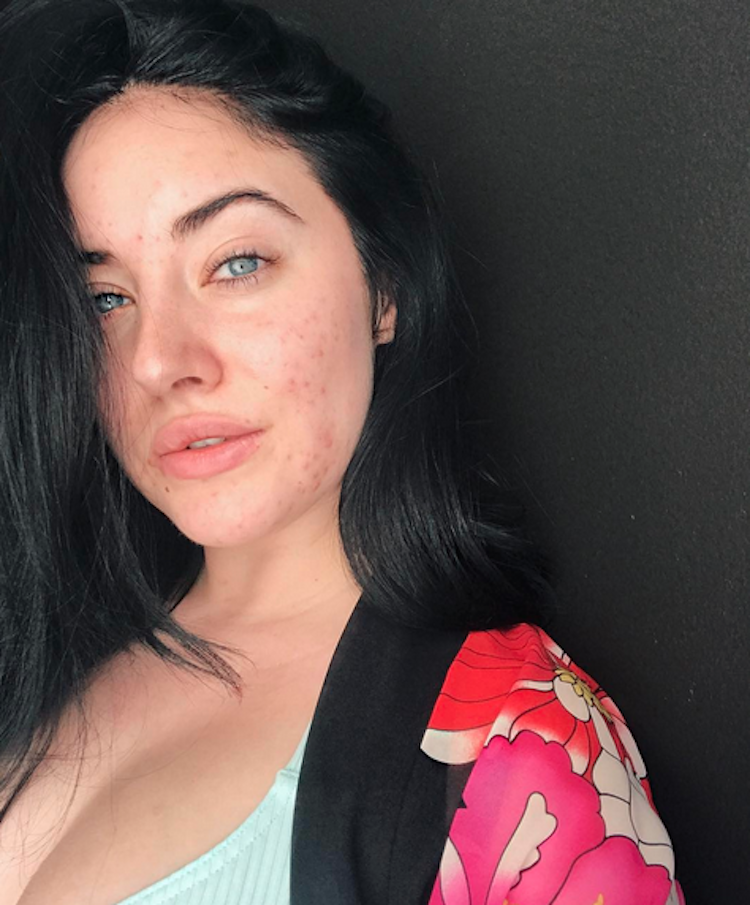Airplane restrooms. Clothing store dressing rooms. The bathroom cabinet. As any skin-obsessive knows, these places have that perfect combination of uninterrupted mirror access and unflattering lighting necessary to inspect every (blocked) pore of your face. Crucially, each of them is also private. Because pimples are still, for the most part, a reality we try to reckon with in secrecy. We tend to them alone in our bedrooms. We apply creams and cover-up. We erase them with skin-smoothing app filters. And when they break out into public view we’re at best annoyed (see: My So-Called Life episode “The Zit”) and, at worst, dangerously depressed.
But things are changing. Thanks largely to a generation of young writers, artists, and activists, public conversations about — and perceptions of — our bodies have begun to shift dramatically in recent years. Photographer Petra Collins kickstarted a movement to reframe female body hair as natural and beautiful. Models including Myla Dalbesio, Barbie Ferreira, Iskra Lawrence, and Charli Howard have fought for the representation of different shaped bodies in fashion campaigns and runway shows. Activist Kiran Gandhi has made periods into a public talking point.
Yesterday, model Starlie Smith posted a photograph of her seemingly makeup-free face on Instagram with the caption “Also, WHO CARES IF YOU HAVE ACNE YOU ARE BEAUTIFUL (A love note to myself & others struggling) #honest.” The photo prompted an outpouring of responses on Instagram (as well as over 8,000 likes), and triggered a wave of acne positivism on Reddit.
“Thank you so much for this,” wrote one Instagram user under Smith’s photo, “I’m struggling with acne too, and some days I’m crying because of it, but you remind me that it’s not worth it 🙂 ❤” Another commented, “I saw this picture and thought, ‘holy shit, if a goddess like Starlie can have acne, maybe I can have acne and still be pretty.'”
Now that facts of nature like cellulite and menstruation have finally entered mainstream conversation, isn’t it time we also, finally, remove pimples from the circle of shame? Acne is the most prevalent skin condition in the Unites States, affecting up to 50 million Americans a year. But it’s also a human-only disease (with a $3-billion treatment industry behind it), which makes it extremely difficult to test and develop cures. In other words, pimples likely aren’t going anywhere, so we may as well embrace them.
Starlie is one of the four insanely beautiful, proudly Mormon, model-musician Smith siblings. She has an Instagram following of 108k, plays in the family band The Atomics, and last month walked in Dolce and Gabbana’s fall/winter 17 show. And, as Reddit users pointed out today, her face during the show was not plastic-smooth. Despite a thick layer of makeup, her skin’s texture was visible and refreshingly relatable.
“I thought that this could be uplifting for those struggling with acne,” said the Reddit user who shared the image on the subreddit “skincare addiction.” “I certainly did feel better about myself after seeing this. It sounds silly but [it’s] true.” Far from silly, the thread has become a supportive forum for discussing acne’s impact on self-esteem, methods and medications for controlling breakouts, and the relief of seeing people with acne portrayed in a positive light.
Smith isn’t the only public figure who’s helping to dismantle the ideal of “perfect skin.” Petra Collins once issued a warning on her Instagram that read, “unfollow me now if you can’t deal with pimples, hair, stretchmarks etc literally anything that isn’t airbrushed.” She and collaborator Madelyne Beckles often include pimple-faced friends in their work. Just this week, actress and activist India Menuez shared an image with a feathered friend that she captioned “pimples & parakeets.” And actresses Bella Thorne, Zendaya, and Selena Gomez have all spoken out about their struggles with their skin.
Last year, the Malaysian designer Moto Guo presented a collection on models whose faces glowed with red flare-ups of acne. (Makeup artist Roberta Betti confirmed that the pimples were real, though she amplified them with a little lip liner.) While Guo may have been sending up fashion’s obsession with youth, his show unleashed a slew of articles touting acne as a “fashion trend” — raising questions about just how far fashion’s supposed embrace of “real” people goes.
If we’re going to prove that the current body positivity movement is more than just skin deep, we need to extend our embrace of our skin — in all its variousness — beyond the catwalk and social media. Pimples are a natural part of being human, it’s time we let them shine.
Credits
Text Alice Newell-Hanson
